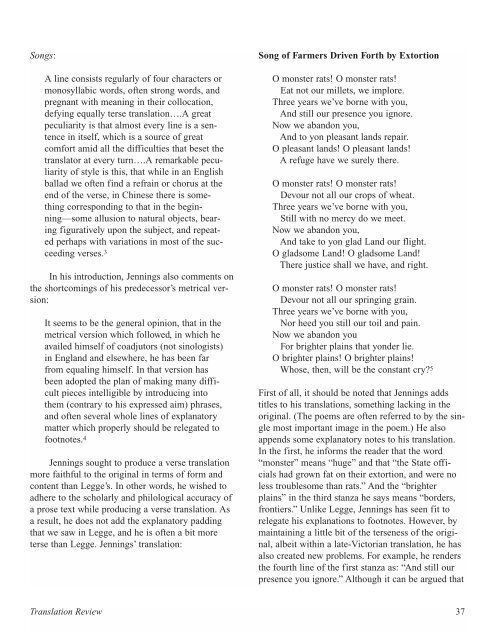Translation Review - The University of Texas at Dallas
Translation Review - The University of Texas at Dallas
Translation Review - The University of Texas at Dallas
Create successful ePaper yourself
Turn your PDF publications into a flip-book with our unique Google optimized e-Paper software.
Songs:<br />
A line consists regularly <strong>of</strong> four characters or<br />
monosyllabic words, <strong>of</strong>ten strong words, and<br />
pregnant with meaning in their colloc<strong>at</strong>ion,<br />
defying equally terse transl<strong>at</strong>ion….A gre<strong>at</strong><br />
peculiarity is th<strong>at</strong> almost every line is a sentence<br />
in itself, which is a source <strong>of</strong> gre<strong>at</strong><br />
comfort amid all the difficulties th<strong>at</strong> beset the<br />
transl<strong>at</strong>or <strong>at</strong> every turn….A remarkable peculiarity<br />
<strong>of</strong> style is this, th<strong>at</strong> while in an English<br />
ballad we <strong>of</strong>ten find a refrain or chorus <strong>at</strong> the<br />
end <strong>of</strong> the verse, in Chinese there is something<br />
corresponding to th<strong>at</strong> in the beginning—some<br />
allusion to n<strong>at</strong>ural objects, bearing<br />
figur<strong>at</strong>ively upon the subject, and repe<strong>at</strong>ed<br />
perhaps with vari<strong>at</strong>ions in most <strong>of</strong> the succeeding<br />
verses. 3<br />
In his introduction, Jennings also comments on<br />
the shortcomings <strong>of</strong> his predecessor’s metrical version:<br />
It seems to be the general opinion, th<strong>at</strong> in the<br />
metrical version which followed, in which he<br />
availed himself <strong>of</strong> coadjutors (not sinologists)<br />
in England and elsewhere, he has been far<br />
from equaling himself. In th<strong>at</strong> version has<br />
been adopted the plan <strong>of</strong> making many difficult<br />
pieces intelligible by introducing into<br />
them (contrary to his expressed aim) phrases,<br />
and <strong>of</strong>ten several whole lines <strong>of</strong> explan<strong>at</strong>ory<br />
m<strong>at</strong>ter which properly should be releg<strong>at</strong>ed to<br />
footnotes. 4<br />
Jennings sought to produce a verse transl<strong>at</strong>ion<br />
more faithful to the original in terms <strong>of</strong> form and<br />
content than Legge’s. In other words, he wished to<br />
adhere to the scholarly and philological accuracy <strong>of</strong><br />
a prose text while producing a verse transl<strong>at</strong>ion. As<br />
a result, he does not add the explan<strong>at</strong>ory padding<br />
th<strong>at</strong> we saw in Legge, and he is <strong>of</strong>ten a bit more<br />
terse than Legge. Jennings’ transl<strong>at</strong>ion:<br />
Song <strong>of</strong> Farmers Driven Forth by Extortion<br />
O monster r<strong>at</strong>s! O monster r<strong>at</strong>s!<br />
E<strong>at</strong> not our millets, we implore.<br />
Three years we’ve borne with you,<br />
And still our presence you ignore.<br />
Now we abandon you,<br />
And to yon pleasant lands repair.<br />
O pleasant lands! O pleasant lands!<br />
A refuge have we surely there.<br />
O monster r<strong>at</strong>s! O monster r<strong>at</strong>s!<br />
Devour not all our crops <strong>of</strong> whe<strong>at</strong>.<br />
Three years we’ve borne with you,<br />
Still with no mercy do we meet.<br />
Now we abandon you,<br />
And take to yon glad Land our flight.<br />
O gladsome Land! O gladsome Land!<br />
<strong>The</strong>re justice shall we have, and right.<br />
O monster r<strong>at</strong>s! O monster r<strong>at</strong>s!<br />
Devour not all our springing grain.<br />
Three years we’ve borne with you,<br />
Nor heed you still our toil and pain.<br />
Now we abandon you<br />
For brighter plains th<strong>at</strong> yonder lie.<br />
O brighter plains! O brighter plains!<br />
Whose, then, will be the constant cry? 5<br />
First <strong>of</strong> all, it should be noted th<strong>at</strong> Jennings adds<br />
titles to his transl<strong>at</strong>ions, something lacking in the<br />
original. (<strong>The</strong> poems are <strong>of</strong>ten referred to by the single<br />
most important image in the poem.) He also<br />
appends some explan<strong>at</strong>ory notes to his transl<strong>at</strong>ion.<br />
In the first, he informs the reader th<strong>at</strong> the word<br />
“monster” means “huge” and th<strong>at</strong> “the St<strong>at</strong>e <strong>of</strong>ficials<br />
had grown f<strong>at</strong> on their extortion, and were no<br />
less troublesome than r<strong>at</strong>s.” And the “brighter<br />
plains” in the third stanza he says means “borders,<br />
frontiers.” Unlike Legge, Jennings has seen fit to<br />
releg<strong>at</strong>e his explan<strong>at</strong>ions to footnotes. However, by<br />
maintaining a little bit <strong>of</strong> the terseness <strong>of</strong> the original,<br />
albeit within a l<strong>at</strong>e-Victorian transl<strong>at</strong>ion, he has<br />
also cre<strong>at</strong>ed new problems. For example, he renders<br />
the fourth line <strong>of</strong> the first stanza as: “And still our<br />
presence you ignore.” Although it can be argued th<strong>at</strong><br />
<strong>Transl<strong>at</strong>ion</strong> <strong>Review</strong> 37

















